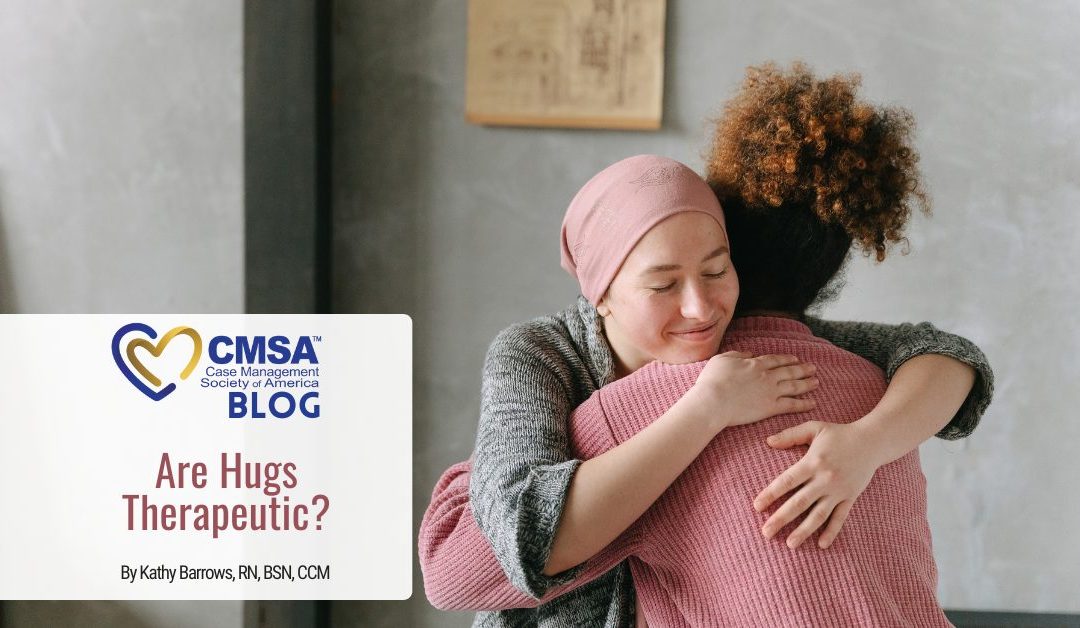By Kathy Barrows RN, BSN, CCM
I will confess that I am a long-time HUGGER. It is my way of showing others I care. Giving a hug can comfort someone when they are sad or as a way of congratulating them for an exciting success. Hugging is like saying I care about you to the person you are hugging. I always ask the person first if I may give a hug since some people are uncomfortable with hugging or touching. It may be related to past emotional trauma, making them very guarded about physical contact to help protect themselves from any additional pain or painful memory.
The word hug comes from the ancient Scandinavian word “hugga” which means to comfort. Research shows that babies wither without hugs from their mothers and that holding and touching reduces anxiety, improves sleep, and helps us empathize with others as we grow up. Hugging reduces blood pressure related to cortisol, the stress hormone, and increases the happy hormone, oxytocin, which helps us bond with others. Oxytocin also makes us more resistant to fatigue, infections, depression, pain, and cravings while increasing our patience with a frustrating world. Hugs lasting more than 20 seconds release oxytocin. (Rick Adams, May 2021)
Hug Day is celebrated on the sixth day of Valentine’s Week and the next Hug Day will be February 12, 2024. It is hard to deny the power a simple hug can have over our moods and general well-being and how such a simple gesture can help melt your troubles away. You can hug someone to celebrate their highest of highs and to soothe them during their lowest of lows. Another fantastic thing about hugs? They are free!
A patient of mine once shared with me how to give a hug over the phone, which was extremely helpful since my patient contacts were telephonic. My patient said to tell the other person to put one hand on one of their shoulders and the other hand on their other shoulder, making an X, and then squeeze to simulate a hug from the person calling. It usually results in a smile. The virtual hug is, of course, in accompaniment to my traditional tasks, like asking if the person has any questions or needs my assistance with anything.
Another example of therapeutic hugs is the benefit of animal therapy. Therapy Dogs International provides free visits of dogs to hospitals, nursing homes, assisted living facilities, hospices, and more to give companionship to elderly patients. Dogs in nursing homes have been shown to decrease elderly depression, loneliness, and stress. Elaine Smith, Founder of Therapy Dogs International, has Headquarters in New Jersey and programs available across the United States and areas of Canada. Samantha Walker, DNP, MSN, CCM did a Digital Session for #CMSA2023 called Therapeutic Robotic Companion Pets on Seniors with Alzheimer's Disease and Dementia in Nursing Homes. She highlighted a study that showed all 5 participants engaged with & formed bonds with their robotic cats. The nursing home staff noted residents' pleasure with their robotic companions. When someone has PTSD, anxiety, ADHD, or other mental health conditions, you may have heard about Equine/horse therapy as a possible treatment option. This Equine Therapy for Autism video discusses horses being therapists for children with Autism due to the bonding between the children and the horses. The Equine/horse therapist supervises the entire experience. (Katie Hale, April 11, 2021)
So, hugs ARE therapeutic! Hugs are given in many different situations: parents to children, person to person, person to animal, and even over the phone. Hugs help people feel cared for and help them feel valued — so give the gift of a hug today!
Exciting News: The CMSA #CMWeek2023 Schedule is HERE: https://cmsapmg.wpenginepowered.com/about/national-cm-week/ Get ready for a week of inspiration and insight as we celebrate Case Management Excellence! You’ll have education, networking, mindfulness, PRIZES and an open forum on how to demonstrate your value as a case manager! Plus, bonus webinars during the month of October — It’s going to be an incredible week, make that MONTH!
Bio: Kathy Barrows, RN, BSN, CCM worked as a telephonic Complex Case Manager RN at UnitedHealthcare worked with population from newborn to Medicare secondary population. She was employed at UnitedHealthcare for over 32 years and has worked in utilization review, admission counseling, “Welcome Home”, predictive model and complex case management with complicated patients. Previous work experiences include staff nurse in orthopedics & medical-surgical, charge nurse in orthopedics, assistant nurse manager in orthopedics and nurse manager in step-down Surgical Intensive Care unit at St Elizabeth Medical Center in Dayton, Ohio for over 25 years. Clinical experience included 10 years in orthopedics, 3 years in step-down Surgical Intensive Care unit and 3 years in medical-surgical units. She has been a member of Southern Ohio Valley CMSA since 2005 and a board member since 2010 serving as Secretary, Treasurer Elect, Treasurer, Director for multiple terms, Vice President and for 9 months as President Elect. She received the Case Manager Excellence of Service award from SOV-CMSA in 2012. She has been a poster presenter at National CMSA fifteen times. Article with Janet Coulter two times in CMSA Today. Albert Nelson Marquis Lifetime Achievement 2019 from Marquis Who’s Who. Nominated for Super Hero @ United Health Group multiple times. Nominated for Sages Award multiple Times.


Wow Kathy, this is such a great post and really interesting! I love the idea of a “virtual” hug over the telephone. Keep the hugs coming!!! ❤
Mary Beth,
Thank you for the positive input!!
Thanks Kathy. So important for our patients and ourselves.
Laura,
Thank you for the positive input!!
Great blog, Kathy!